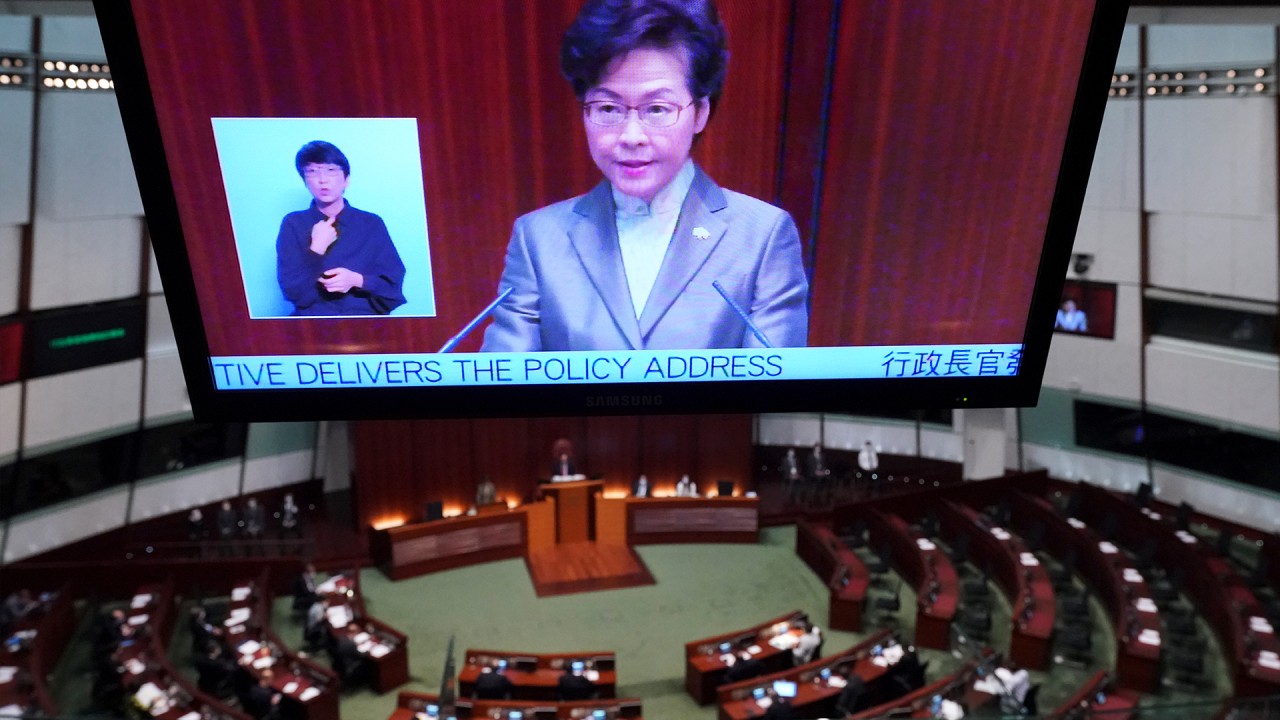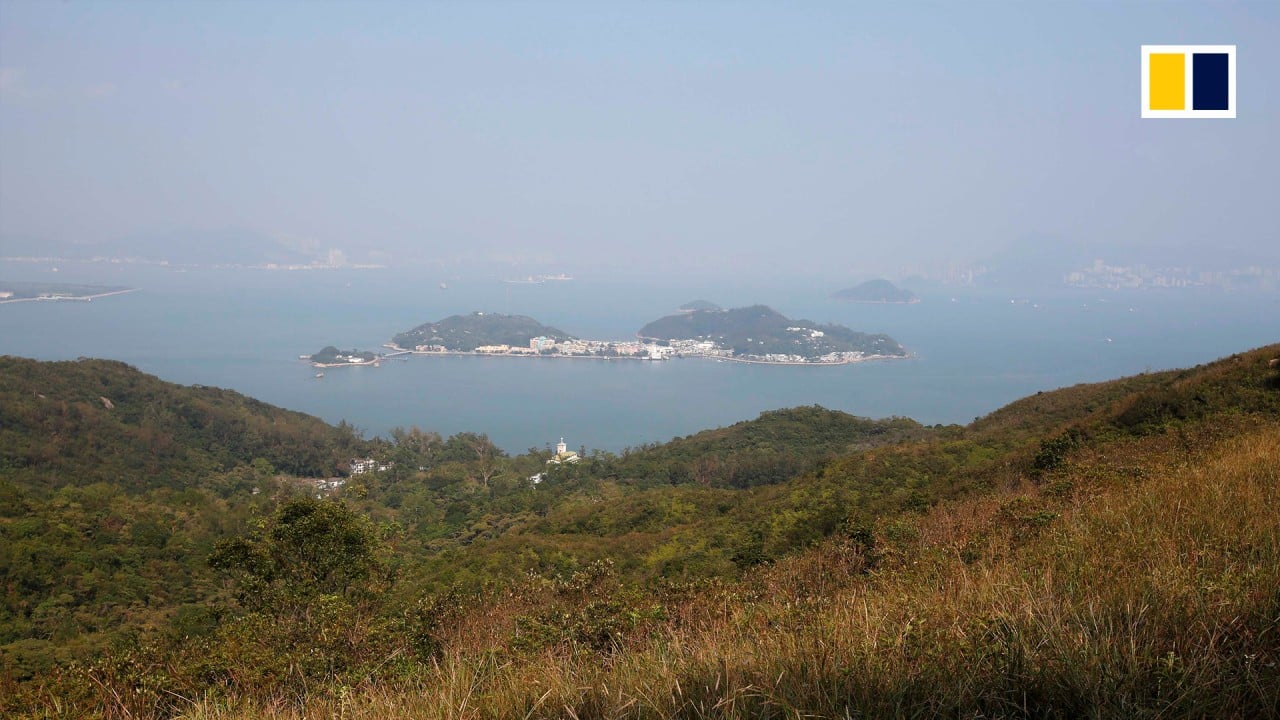
Hong Kong leader Carrie Lam vows to restore social and constitutional order as well as revive ailing economy
- Having postponed her annual policy address by over a month, Carrie Lam faced heightened public expectations as she delivered a speech lasting more than two hours
- Lam places her full faith in mainland China’s support for cross-border initiatives to help lift Hong Kong out of its current impasse
Hong Kong’s leader unveiled a lengthy policy blueprint on Wednesday aimed at urgently rebuilding confidence in a city beset by political turmoil and financial uncertainty, promising to restore social and constitutional order as well as revive the ailing economy.
For the first time in the Legislative Council chamber, there were no opposition lawmakers to interrupt her, having all recently quit to protest against the disqualification of four colleagues, as Lam devoted a large part of her speech on politics.

04:47
Hong Kong leader Carrie Lam delivers 2020 policy address
“Hong Kong has become an obvious gaping hole in national security and presented significant risks to the country.”
As it happened: Hong Kong leader’s policy address vows to ‘relaunch city, rebuild trust’
But on a softer note, the chief executive said some leniency would be shown to youngsters aged below 18 facing prosecution for their roles in the anti-government protests if their offences were not serious and they admitted wrongdoing.
On the financial front, Lam said the Stock Connect trading schemes between Hong Kong and Shanghai and Shenzhen would be enhanced by opening it up to loss-making biotechnology firms listed in Hong Kong, as well as stocks listed on Chain’s sci-tech innovation board.
Hong Kong’s Airport Authority would acquire additional shares in Zhuhai Airport to build a “world-class aviation cluster”, she said.

02:43
Why Carrie Lam’s Lantau land reclamation plan is so controversial
Noting that Hong Kong’s gross domestic product was expected to shrink by 6.1 per cent this year, the worst decline on record, she spoke of the need to take advantage of mainland China’s growth momentum at a time when US and European economies were falling into deep recession.
“Anyone who says the repeated mentioning of the central government [in the policy address] means a disregard for Hongkongers is trying to confound black with white,” Lam said later at a press conference when asked if she was being too reliant on Beijing.
“They just create things out of whole cloth. If this is the only criticism certain political parties have about my policy address, I would believe that it means they have nothing else to criticise.”
How does Hong Kong stay relevant in China’s new technological era?
In a bid to tackle the acute shortage of affordable homes, the chief executive offered specific measures such as turning some hotels into temporary housing and, for the first time, giving cash subsidies to those on the waiting list for public flats.
As for her signature policy project, the Lantau Tomorrow Vision to build a new metropolis on artificial islands created through massive reclamation, Lam said the government would expedite it by prioritising a funding request to the legislature for a preliminary study.
“For the sake of Hong Kong’s future, the current-term government will not give up on the Lantau Tomorrow Vision,” she said, responding to concerns about the huge costs, value for money and environmental impact.
I have no plans to tackle issues relating to constitutional development during my remaining one year in office
On the education front, Lam stressed the need to stop politics from entering school campuses and reform liberal studies in particular.
“We cannot bear to see that with the infiltration of politics into school campuses, students are drawn into political turbulence or even misled to engage in illegal and violent acts, for which they have to take legal responsibilities that will impact on their lives,” she said.
“The direction of reform in future should focus on rectifying the previous deviation from the subject’s objectives, and reinstating it as the platform to help students establish a sound foundation of knowledge, make connections across different subjects, and develop critical thinking skills.”
She ended her speech by summing up the task ahead for her administration: “The [Hong Kong] government will double its efforts to put the epidemic under control, revive the economy, restore social order, rebuild Hong Kong’s international reputation and people’s confidence in the government, with a view to relaunching Hong Kong.”

Asked later whether she would run for a second term in 2022, Lam replied: “We have gone through an extremely challenging time. Those hardships put me through a mill. A burnished knife is sharper. I hope to lead the Hong Kong government to strive ahead and build a strong foundation with renewed perseverance. I have not thought of other issues.”
Lam ruled out embarking on democratic reforms before the city’s political and constitutional order could be restored, referring to opposition politicians’ rejection of previous proposals put forward by the government.
“We all know who should take the blame for the failure. Back in 2014, we put forward a liberal proposal for the election of the chief executive by universal suffrage. It’s a pity that we could not realise it because of the Occupy movement and conflicts in the legislature,” she said.
“I have no plans to tackle issues relating to constitutional development during my remaining one year in office.”

Democratic Party leader Wu Chi-wai, who along with other opposition lawmakers did not attend the policy address, said it was not drafted for Hongkongers but was Lam’s attempt to show loyalty to Beijing.
Wu said the blueprint had not tried to solve the political stalemate in Hong Kong, and accused Lam of trying to pave the way to disqualify opposition district councillors – who control 17 out of 18 councils – by amending the two laws over oath-taking.
He also believed Lam had been too reliant on the mainland, and should not neglect the international arena.
“[Lam] has suggested that the future of Hong Kong can only rely on the development of the mainland economy and the Greater Bay Area,” he said. “The whole policy address is taking Hong Kong in the wrong direction.”
Pro-establishment lawmakers generally agreed with Lam’s move to dedicate a substantial portion of her speech to constitutional order.
“The Democratic Alliance for the Betterment and Progress of Hong Kong believes that it helps set things on the right course,” Starry Lee Wai-king, the party’s chairwoman, said.
Praising the policy address for crafting out the right economic approach by connecting the city more closely with the mainland through the Greater Bay Area project, they, however, cast doubt on the government’s efficiency on battling the coronavirus, as well as its policies on social issues such as housing.



